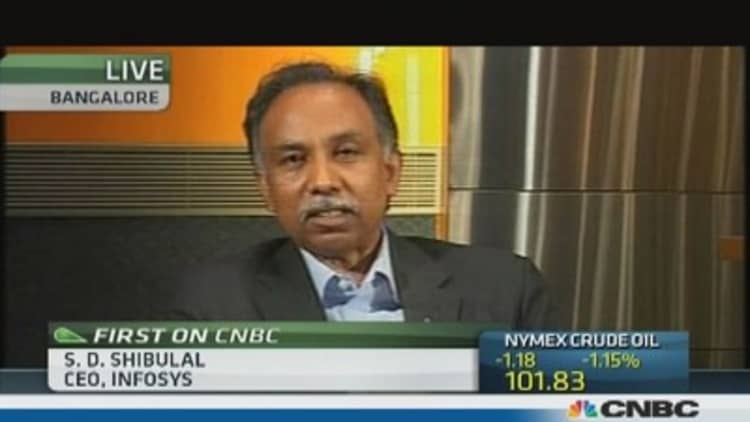For over a decade, there's been an ongoing argument about the job market. On one side, various companies are saying they can't find enough skilled workers in the U.S. and therefore have to import workers from overseas. On the other side, labor organizations are saying greedy Corporate America wants cheap foreign labor rather than higher-priced American workers.
Now, smack in the middle of this ongoing debate, throw a news event from last week: One of the largest suppliers of overseas workers to American companies, Infosys, agreed to pay $35 million to settle a federal probe. Investigators alleged that the company used fraudulent tactics to get cheap visitor visas for its personnel, rather than more expensive worker visas. The company denied guilt, but paid the largest settlement ever in an immigration case.
So, it makes you wonder about the larger debate: If Infosys had to pay higher visa costs, would its workers really be that cheap? If American companies really don't have enough qualified workers, would they still import them despite the higher cost?
"The case should highlight this widespread and corrosive business practice of using guest-worker visas to replace American workers and to facilitate the offshoring of high-wage American jobs," said Ron Hira, a public policy professor at the Rochester Institute of Technology and author of "Outsourcing America," in an email response to questions. "It is an extraordinarily profitable business model (more than 25 percent net margins) that is bad for American workers as well as the American economy ... Everyone who has objectively looked at the 'skills gap' comes to the conclusion that one simply doesn't exist — particularly in these ordinary IT jobs."
Not everyone agrees, however.
"This Infosys squabble has nothing at all to do with the systemic skills gap/open jobs situation in America," said Gary Beach, author of "The US Technology Skills Gap." "It is much ado about nothing."
Beach argues that the Infosys investigation concerned only 15 percent of the company's workforce in the United States. Even if, for argument's sake, other Indian labor suppliers were misusing guest-visa programs in a similar fashion, which hasn't been suggested, it would only amount to 7,000 jobs, according to Beach's calculations.
"It is still a drop in the bucket of the 12 million unemployed Americans and 4 million open jobs," Beach said in an email exchange.
Still, others argue the Infosys settlement misses the point.

"I have long criticized the hoopla given to such cases as scapegoating, attempts to distract attention from the fact that abuse of immigration policy (H-1B, employer-sponsored green cards, etc.) pervades the ENTIRE tech industry, NOT just the Indian body shops such as Infosys," Norm Matloff, a professor of computer science at the University of California, Davis, said in a commentary. "The Indian firms hire at a less-skilled level of worker and yes, sometimes do violate the rules, but why is that any different from mainstream U.S. firms using industry-installed loopholes to hire foreign students from U.S.universities instead of equally-qualified U.S. citizens and permanent residents? Abuse is abuse."
Apparently the job-skills debate will go on.
—Allen Wastler is managing editor of CNBC Digital. Follow him on Twitter @AWastler. You can catch his commentary here and on CNBC Radio. And check out his fiction.


